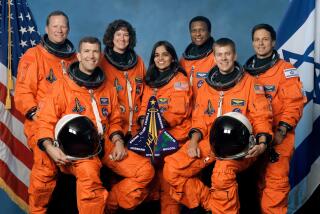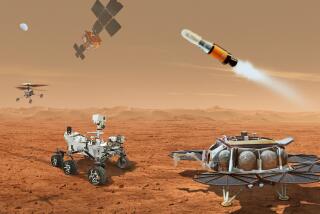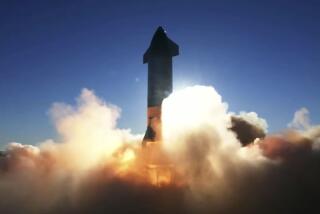Humans in Space
- Share via
The tragedy of the space shuttle Challenger is already spurring a fresh look at the U.S. space program and its heavy reliance on manned missions to the virtual exclusion of all others. Many have argued, and will renew their arguments, that man in space is an unnecessary and expensive frill and that robots could accomplish just as much at much less cost.
There is a need for unmanned vehicles in space, and they can accomplish much, as Voyager 2 has just proved again. But people bring to space the indispensable quality of judgment, which is unique to them. They can evaluate changing conditions and make split-second decisions based on incomplete or contradictory information. Cutting back the manned space program would be a mistake. The shuttle was an important and ambitious government activity before Tuesday’s accident, and, despite the numbing loss of people and equipment, it remains one now.
It has been clear for some time that, in order to keep the shuttle fleet flying, the orbiters have been used for tasks such as launching satellites that could have been done more easily, cheaply and reliably on old-fashioned expendable rockets. It has also been clear that the shuttle will never pay for itself and that the taxpayers will have to subsidize every flight. It has been clear to the Pentagon for several years that the shuttle’s schedule is so unreliable that it must have its own unmanned rockets on standby in order to be sure that it can get satellites into space when it needs them.
But the shuttle is an experimental vehicle, and aerospace technology is still in its infancy. Ending the shuttle program now would be like scuttling the aviation industry in 1908, when Tom Selfridge became the first person to die in an airplane crash.
This is the generation that first stepped off the Earth, a momentous event in the history of humanity. There will be future endeavors in space, and they will require the presence of people and a way to get them up and down. The shuttle remains vital to the exploration of the next frontier.
All people mourn the loss of Francis Scobee, Michael Smith, Judith Resnik, Ronald McNair, Ellison Onizuka, Gregory Jarvis and Christa McAuliffe, but the accident that took their lives should not deter this nation from extending its commitment to space. The space agency should find out what went wrong, do what it must to make sure that it won’t happen again, and pick up where the shuttle program left off.
More to Read
Sign up for Essential California
The most important California stories and recommendations in your inbox every morning.
You may occasionally receive promotional content from the Los Angeles Times.













